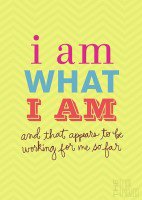6 September 2016 by Lisa Meloncon
 As job market season approaches, annual review time is here for us or you’re just trying to figure out the next stage of your career (whatever that may be), I want to repeat a refrain that I say a lot: You have the right to describe yourself as a scholar and teacher in any way that you want. But you also have to figure out who you want to be.
As job market season approaches, annual review time is here for us or you’re just trying to figure out the next stage of your career (whatever that may be), I want to repeat a refrain that I say a lot: You have the right to describe yourself as a scholar and teacher in any way that you want. But you also have to figure out who you want to be.
I say this a lot because it’s important that you understand who you want to be and/or who you are as a scholar and teacher. So because I was thinking about it and it came up in a couple of conversations recently, I thought I’d expand it out a bit. It intersects with the recent writing here about how to talk about service by Michele and Pat.
At most institutions, the documents that govern reappointment, tenure, and promotion all say in some form or another that you need to have a research agenda or some way that people know you. So for example, I am firmly a member of the field of technical and professional communication (TPC). Within that field, I am known for programmatic scholarship. Also within TPC, I do the rhetoric of health and medicine (which, for me, includes disability and accessibility issues). Now the rhetoric of health and medicine also moves outward to others areas like rhetoric, composition, communication, disability studies, and linguistics. Others can and should identify and describe themselves in other ways, if you do the rhetoric of health and medicine from those other views. But for me and how I identify and talk about myself, I do the rhetoric of health and medicine as it is associated with TPC. But that’s me.
The over arching point is that you have to be able to describe yourself and demonstrate through your published scholarship, or your dissertation and research trajectory, who you are as a scholar (and teacher). And I cannot stress enough that your institutional documents and your mentors should help guide you in the ways that you define and describe yourself. Because the sooner you can start to articulate it, the easier it is on you every time you need to write a version of it. (And throughout your career, you write this a lot. Did I say a lot.)
But, once you have that figured out, you are in control of that identity. I gave an example recently that I am a terrible record keeper in some ways. By that I mean, I don’t list every single thing that I do in my annual reports (which my institution requires at the end of the academic year as a way to review faculty and to make decisions on merit raises when those are available during our contract cycles) or even on my CV. One I find it tedious and time consuming and not the best use of my time, and second, some of it doesn’t fit the way that I describe myself as a scholar and teacher. That’s my own choice. Others choose to put in their annual report every time they answered a student email. And that’s their choice. The key is to make choices based on your institutional culture and how you want to describe yourself.
 It’s important to remember that the act of describing yourself and the work you do is a rhetorical one that can shift based on the circumstance. Another example is the CV. Often times you may be asked to submit a short CV, particularly in conjunction with research related applications (for things like fellowships or a contributor to an edited collection). The short CV in this instance generally only includes your publication record. If you’re asked to submit a short CV for a teaching award, then it would include your teaching highlights. But, you can also have CV versions for other uses as well. My CV that I have on my website is different from the CV that I submit with my annual report, and I have, yet, another version of the CV that I would submit for different types of applications. The point is that the CV, too, is also a rhetorical document that you can change or shift based on what you’re trying to accomplish with it and how you are describing yourself as a scholar and teacher.
It’s important to remember that the act of describing yourself and the work you do is a rhetorical one that can shift based on the circumstance. Another example is the CV. Often times you may be asked to submit a short CV, particularly in conjunction with research related applications (for things like fellowships or a contributor to an edited collection). The short CV in this instance generally only includes your publication record. If you’re asked to submit a short CV for a teaching award, then it would include your teaching highlights. But, you can also have CV versions for other uses as well. My CV that I have on my website is different from the CV that I submit with my annual report, and I have, yet, another version of the CV that I would submit for different types of applications. The point is that the CV, too, is also a rhetorical document that you can change or shift based on what you’re trying to accomplish with it and how you are describing yourself as a scholar and teacher.
This idea of describing yourself also goes to your online identities, if you have them. Your profile on your institutional website, your own personal website, your LinkedIn account, Twitter, academia.edu…..all of these spaces provide you the opportunity to reinforce and define who you are. In today’s digital environment, this is one of the ways that other people come to know you and your work so in some ways it is important to have a consistent identity across platforms. And that identity should intersect with any paper documents you send out. Cause if you list your website on your CV, it’s likely that most of us are going to go there.
One of the great things about this job is that you can explore all sorts of topics and subjects and ask a wide variety of questions. Within that diverse landscape, however, you have to know who you are and then be able to describe it.
This is where the network of #womeninTC can really come in handy. Lots of people out there that can help you narrow it down and give you feedback.
And for y’all on the job market, look for a post by Kristen Moore next week that will get you started thinking about how to approach the job search.
In the meantime, wishing you joy and productivity.